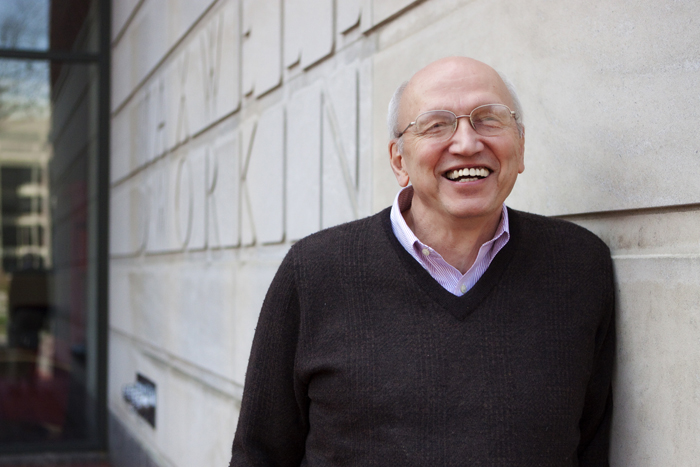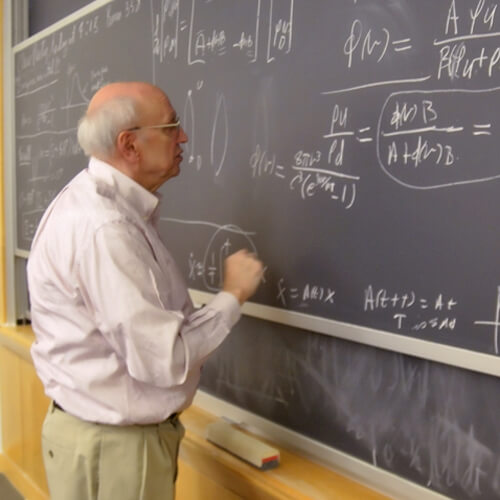News
Roger W. Brockett, a 42-year member of the Harvard faculty, delivered his final lecture on April 26, 2011. Over the course of his career, he has advised more than 60 graduate students. Photo courtesy of Ali Belabbas.

Cambridge, Mass. – April 29, 2011 – Roger W. Brockett, An Wang Professor of Electrical Engineering and Computer Science at the Harvard School of Engineering and Applied Sciences (SEAS), has received the Capers and Marion McDonald Award for Excellence in Mentoring and Advising.
Brockett, a pioneer in control systems theory, founder of the Harvard Robotics Laboratory, and a 42-year member of the Harvard faculty, accepted the award from Dean Cherry A. Murray at an All Hands Meeting today.
“Roger Brockett has clearly earned the admiration of his current and former students, who describe him as ‘a big ideas man,’ ‘a role model,’ ‘instrumental,’ and ‘inspiring,’” Murray said. “He continues to play an important role in their professional development, in some cases decades after they have earned their degrees.”
Established at SEAS in 2008 by Capers W. McDonald and Marion K. McDonald, the McDonald Mentoring Award recognizes leaders in engineering and applied sciences “who, as exemplary mentors and advisors, have significantly and consistently supported the personal and professional development of others.”
“Roger Brockett has made enormous contributions to mentoring, advising, and development of both undergraduate and graduate students at Harvard,” says Vahid Tarokh, a close colleague of Brockett’s who is Perkins Professor of Applied Mathematics and Vinton Hayes Senior Research Fellow at SEAS. “He is truly well deserving of SEAS’ recognition of his contributions.”
Brockett received his Ph.D. from Case Institute of Technology (now Case Western Reserve University) and began his teaching career at the Massachusetts Institute of Technology (MIT) in 1963, joining the Harvard faculty in 1969. He delivered his final lecture here earlier this week and will now retire from teaching.
Over the course of his career, Brockett has mentored more than 60 Ph.D. students, about 50 of them at Harvard, consistently guiding their research toward seminal dissertations that defined new fields within control and systems theory.
His early research at MIT, which focused on stability, produced approximately 20 major papers in the span of just six years.
In the 1970s and '80s, Brockett laid the foundation for the field of geometric nonlinear control theory. His research on the nonlinear filtering and estimation problem, Tarokh says, “answered the most basic question that was driving a great deal of research at the time.”
Brockett has also had a knack for recognizing important problems, questions that were worth pursuing, ahead of colleagues in his field. Publications by Brockett and his students have defined entirely new areas of research, such as information-based control, nonholonomic systems and feedback stabilization, lie theory and robotics, differential equations that solve discrete problems, and quantum computing.
According to Google Scholar, Brockett’s 1983 paper “Asymptotic Stability and Feedback Stabilization” has been cited more than 900 times.
Brockett was also responsible for the creation of the fundamental undergraduate course ES 50, “Introduction to Electrical Engineering,” and co-created the hands-on course ES 51, “Computer-Aided Machine Design,” which asks undergraduates to design and build catapults and remote-control cars.
In 1983, he founded the Harvard Robotics Laboratory (HRL), which today continues its research in areas such as robotic manipulation and control of quantum systems. HRL created new opportunities for undergraduates to take part in engineering and mathematics research, and Brockett has supervised many of their senior theses.
His generous open-door policy, both figurative and literal (he once lost a laptop from his office while speaking with a group of students nearby), applies to undergraduates, graduate students, and colleagues alike.
Navin Khaneja (S.M. ’99, Ph.D. ’00), came to Harvard as Brockett’s Ph.D. student and found a home at SEAS; he is now Gordon McKay Professor of Electrical Engineering.
Through effective teaching, prescient research, and accessible writings; and through his decisions regarding curricula and teaching and research appointments, Khaneja says, Brockett “has had a major influence on the culture of SEAS.”
Previous recipients of the McDonald Mentoring Award have included Michael Brenner, Glover Professor of Applied Mathematics and Applied Physics at SEAS; and Margo Seltzer, Herchel Smith Professor of Computer Science at SEAS and a Harvard College Professor.
“What I find most interesting about Roger’s mentoring of his graduate students is that the mentorship does not end with the student’s graduation,” says Tarokh. “In every manner, his career matches perfectly the criteria for the award.”
Former students look back
"He was a very stimulating teacher, always asking questions and keeping his students alert. Every morning around coffee time, he would come in our offices asking, 'Did you prove any theorems already today?'"
- Jan Willems (Ph.D. '68, MIT), Professor Emeritus, University of Groningen, Netherlands
"Every so often, Roger would see a piece of mathematics or a derived result that was so elegant that he couldn't help himself. He'd circle the result on his chalkboard and write, 'Truth and Beauty.'"
- David Dobkin (Ph.D. '73), Dean of Faculty at Princeton University
"In my student days, I recall how Harvard was widely viewed by many researchers around the world as the 'best place to be' to study control theory. I felt uniquely privileged to grow in such circumstances.
"At the same time, it was not a place for self-congratulation. One had to be clear-headed, thoughtful, and fast on one's feet to be able to address the penetrating questions that Brockett raised in regular lecture classes, research seminars, and private discussions.
"While it is now 33 years since I graduated, I look forward to regular phone calls and emails from Brockett... often prefaced by my question, 'Is this new?' These phone calls and emails have had a substantial influence on my thinking, serving to keep me honest and clear-headed and still able to think on my feet. This is a huge gift."
- P. S. Krishnaprasad (Ph.D. '77), Professor of Electrical and Computer Engineering, University of Maryland
"Dr. Brockett's no-prepared-notes, improvisational lecture style came as a shock at first. It didn't take long for me to realize that his pedagogical style was much more effective than what I had been used to [at MIT]; it forced me to think more deeply about fundamental concepts rather than clever techniques for problem solving.
"It took me a few years longer to realize that I had learned from a once-in-a-generation master.
"On the rare occasion that I thought I had a new and interesting idea or problem, and mentioned it to him, he would pull out some dusty notes that he had worked on 20 years before that addressed an even more advanced version of the problem, usually with a solution."
- Frank Chongwoo Park (Ph.D. '91), Professor of Mechanical and Aerospace Engineering, Seoul National University, Korea
"I, and my fellow graduate students, took a secret pride and satisfaction in working with someone like him. I always felt I was doing something important, and it gave me confidence to keep pursuing that."
- Navin Khaneja (S.M. '99, Ph.D. '00), Gordon McKay Professor of Electrical Engineering at SEAS
"He developed a reputation in the field of control theory of being a rather harsh critic. He would often force his interlocutor to deconstruct his claimed contribution to get to the essence of what is new, and get rid of all ornaments and window dressings.
"However, Professor Brockett applied the very same principles to his own work, and this has led him to have a continued stream of important scientific contributions throughout his career."
- Ali Belabbas (Ph.D. '07), postdoctoral fellow at SEAS
Topics: Computer Science, Bioengineering, Academics
Cutting-edge science delivered direct to your inbox.
Join the Harvard SEAS mailing list.



